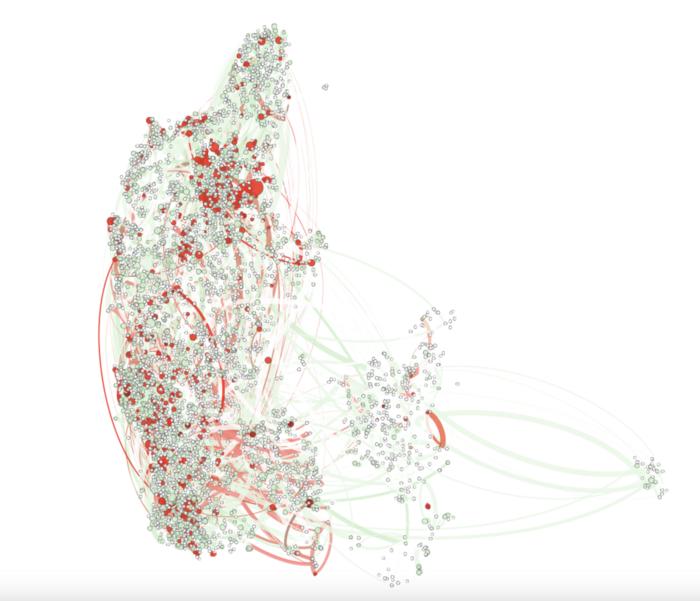Limited impact of current movement restrictions highlights need for enhanced strategies, says study.

Credit: Complexity Science Hub, University of Copenhagen, SEGES
Limited impact of current movement restrictions highlights need for enhanced strategies, says study.
In a recent study published in the Journal of Dairy Science, researchers from the Complexity Science Hub (CSH), the University of Copenhagen, and SEGES have shown that despite stringent movement restrictions among Danish cattle farms Salmonella Dublin continues to propagate, indicating that current strategies are insufficient to curb the spread of the disease.
“We analyzed 11 years of data, including detailed information about infection outbreaks in farms and trading data between farms, and applied advanced social network and simulation modeling to study the movement patterns of cattle among farms,” explain CSH Associate Faculty member Beate Conrady and CSH researcher Elma Dervic.
By mapping out these connections, the researchers aimed to assess how effectively movement restrictions were preventing the spread of Salmonella Dublin. “Surprisingly, we found that disease transmission between farms persists, with cattle movement activities in the previous month being the strongest predictor of farm infections,” says Conrady, who is also an Associate Professor at the Department of Veterinary and Animal Sciences, University of Copenhagen.
Similar network trends were observed for infected and non-infected farms, indicating that the perceived strict movement restrictions had insufficient effect, likely because multi-site farm businesses are still allowed to move animals between their own farm properties. Local transmission, i.e., different transmission pathways in a short distance to neighboring farms, played a relatively minor role.
RECOMMENDATIONS
Given the limitations of current measures, the study calls for a multifaceted approach to managing Salmonella Dublin:
- Pre- and Post-Movement Measures: Implementing stricter control measures before and after movement within a one-month period can reduce the spread of Salmonella Dublin.
- Focused Control Strategies: Enhanced surveillance and targeted interventions based on cattle movement data and farm characteristics can improve the effectiveness of disease control programs. Analyzing the impact of multi-site businesses seems to be important to better understand the spread of Salmonella Dublin infections.
- Policy Recommendations: Adapt control measures to emphasize within-herd biosecurity, and improve the diagnostics and testing before and after cattle movements.
A CLOSER LOOK AT SALMONELLA DUBLIN
Salmonella Dublin is a bacterial infection that poses a threat to cattle health, causing symptoms such as fever, diarrhea, and respiratory problems. The disease is also zoonotic, meaning it can be transmitted to humans through direct contact with infected animals or consumption of contaminated dairy products, potentially leading to severe health issues, especially in immunocompromised individuals.
IMPLICATIONS FOR SOCIETY
This study has profound implications for both farmers and policymakers. For farmers, it means that despite adhering to movement restrictions, their herds remain at risk of infection, which can lead to economic losses due to decreased productivity and increased veterinary costs. For policymakers, the study highlights the urgent need to develop more effective disease management strategies. Relying solely on movement restrictions is clearly not enough to combat the spread of Salmonella Dublin.
“Our study underscores the urgent need to revise existing policies of more dynamic and targeted approaches to control the spread of Salmonella Dublin to protect animal health and safeguard public health,” concludes Conrady.
ABOUT THE STUDY
The study “Social network analysis reveals the failure of between-farm movement restrictions to reduce Salmonella transmission,” by B. Conrady, E.H. Dervic, P. Klimek, L. Pedersen, M. Merhi Reimert, P. Rasmussen, O.O. Apenteng and L.R. Nielsen, was published in the Journal of Dairy Science (doi: 10.3168/jds.2023-24554).
About CSH
The Complexity Science Hub (CSH) is Europe’s research center for the study of complex systems. We derive meaning from data from a range of disciplines – economics, medicine, ecology, and the social sciences – as a basis for actionable solutions for a better world. Established in 2016, we have grown to over 70 researchers, driven by the increasing demand to gain a genuine understanding of the networks that underlie society, from healthcare to supply chains. Through our complexity science approaches linking physics, mathematics, and computational modeling with data and network science, we develop the capacity to address today’s and tomorrow’s challenges.
Journal
Journal of Dairy Science
DOI
10.3168/jds.2023-24554
Method of Research
Data/statistical analysis
Subject of Research
Animals
Article Title
Social network analysis reveals the failure of between-farm movement restrictions to reduce Salmonella transmission
Article Publication Date
23-May-2024




